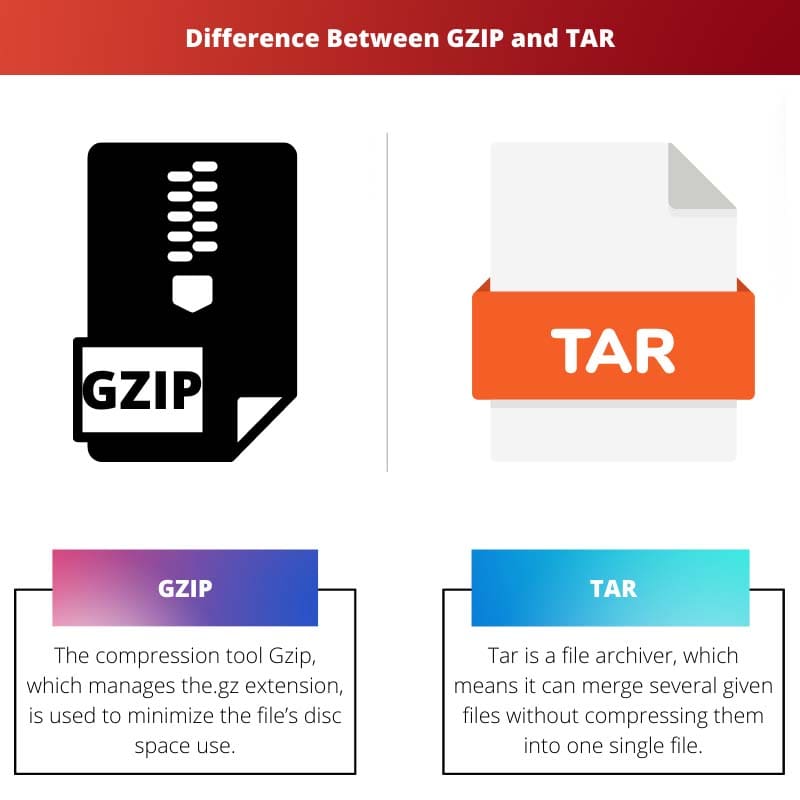The .tar.gz file extension is very popular when one talks about downloading files on systems that are not working on Windows. Unlike other extensions, one does not point to a single program for opening its file but refers to two.
Tar is the name of a format of a file as well as the program that produces it.
Key Takeaways
- Gzip is a file compression utility that compresses a single file, while Tar is an archiving utility that creates an archive of multiple files and directories.
- Gzip reduces the size of a file by compressing its contents, while Tar combines multiple files and directories into a single archive file.
- Gzip does not retain any metadata or directory structure, while Tar retains the directory structure of the files and directories included in the archive.
GZIP vs TAR
The difference between GZIP and TAR is that Tar is a file archiver, which means it can merge several files without compressing them into a single file. Gzip, which handles the.gz extension, is used to compress the file to save space on the hard drive.

Gzip is commonly referred to as a file format and software framework for compressing HTTP content until it is served to a client on Unix and Unix-like systems.
The method has been known to minimize file sizes by up to 80%, resulting in faster page load times, lower bandwidth utilization, and lower SSL overhead (due to a decrease in the number of roundtrips during an SSL handshake).
One can use the tar command to build compressed archives containing a single file or a group of files. Tarballs, gzip, bzip, or tar files are all terms for the archive files that result.
A tar file is a special type of file that combines many files into a single package. It’s similar to an a.zip file in that it can hold several files but in a different file format.
Comparison Table
| Parameters of Comparison | GZIP | TAR |
|---|---|---|
| Connotation | The compression tool Gzip, which manages the.gz extension, is used to minimize the file’s disc space use. | Tar is a file archiver, which means it can merge several given files without compressing them into one single file. |
| Capability of compression | Gzip is a program that compresses a single file (only). | Different files are combined into a single (tar) file with tar. |
| Based on Efficiency | Zip is software that does both archiving and compression. | It creates a single file from several files; it does not compress data unless used in conjunction with a compression program like gzip. |
| Metadata Preservation | Zip lacks behind in preserving metadata. | Tar is far ahead of zip in terms of preserving metadata. |
| Tests passed | Gzip only passes 17% of the tests, which is quite low. | Tar has a passing percentage of 65 (almost 3.5 times that of a zip file). |
What is GZIP?
GNU zipped files use the GNU ZIP algorithm to enforce compression specifications and guidelines, and they are stored in the GZIP format with the gzip extension.
These might contain some files that the user has chosen to be compressed with the help of a GNU ZIP algorithm. The size of the uncompressed versions of the files contained in the GZIP format would be smaller than the size of the resulting GZIP file.
The GNU ZIP algorithm converts larger files per the user’s needs, and most Unix-based systems follow GZIP compression standards and specifications.
Many Microsoft Windows file compression and decompression tools support GZIP files, meaning they can be used to build, decompress, and access the content stored in these files.
The DEFLATE algorithm, which combines LZ77 and Huffman coding, is the foundation of gzip. DEFLATE was designed to be a substitute for patent-protected data compression algorithms like LZW, which restricted the usability of Compress and other common archivers at the time.

What is TAR?
A TAR file is in the Consolidated Unix Archive format, which is short for Tape Archive and referred to as tarball. One needs an archive-opening program or instructions to open a TAR file.
Since it can store several files in one single file, the TAR file format is common for archiving and sending multiple files over the internet, such as for software downloads.
In the case of Linux and Unix systems, the TAR file format is commonly used., but it is mostly used to store data rather than compress it. After being developed, when TAR files are compressed, they become TGZ files with the extensions TGZ, TAR.GZ, or GZ.
The most popular zip/unzip program will open TAR files because they are a common archive format.
Two of the best free file extractors are PeaZip and 7-Zip, which can open and create TAR files, but there are plenty of other options on this list of free file extractors.
Other TAR openers include B1 Online Archiver and ezyZip, which run in your browser rather than as a downloaded application. To remove the contents of the TAR, upload it to one of these two websites.

Main Differences Between GZIP and TAR
- The compression tool Gzip, which manages the.gz extension, is used to minimize the file’s disc space use. On the other hand, Tar is a file archiver, which means it can combine several files into a single file without compressing them.
- Gzip is a program that compresses a single file (only), whereas Different files are combined into a single (tar) file with tar.
- Zip is software that does both archiving and compression. Tar creates a single file from several files; it does not compress data unless used in conjunction with a compression program like gzip.
- Zip lacks behind in preserving metadata, whereas Tar is far ahead of Zip in terms of preserving metadata.
- Gzip only passes 17% of the tests, which is quite low, whereas Tar has a passing percentage of 65(almost 3.5 times that of a zip file).

- https://dl.acm.org/doi/abs/10.1145/2664666.2664670
- https://stratadoc.stratus.com/vos/19.2.1/r553m-01/wwhelp/wwhimpl/common/html/r553m-01.pdf

The article’s explanation about GZIP and TAR was very detailed and enlightening. Well done!
Definitely, the article provided a comprehensive overview of GZIP and TAR. I thoroughly enjoyed reading it.
The article was a comprehensive guide to understanding the differences between GZIP and TAR. Kudos to the author!
Absolutely, I found the article to be an exceptional resource for learning about GZIP and TAR.
The author’s take on GZIP and TAR was very insightful and well-articulated. Great job!
I found the article to be very informative, particularly the detailed comparison between GZIP and TAR. Highly recommended read.
Agreed, the depth of information provided about GZIP and TAR was impressive. Well researched article!
The use of a comparison table in the article made it easy to differentiate between GZIP and TAR. Great article!
The article’s analysis of GZIP and TAR was comprehensive and insightful. I learned a lot from reading it.
I totally agree. The article was very well-written and provided valuable insights into GZIP and TAR.
The author presented a compelling and conclusive comparison between GZIP and TAR. Very fascinating read.
The discussion of GZIP and TAR was well-articulated and thorough. I thoroughly enjoyed reading it.
Absolutely, the article’s detailed exploration of GZIP and TAR was captivating and enlightening.
The article provides a detailed and clear explanation of GZIP and TAR. I will definitely share it with my colleagues.
This article helped me gain a better understanding of GZIP and TAR. Very well-written and informative.
I completely agree. The content was presented in a clear and concise manner, making it easy to comprehend.
I appreciate the thorough comparison between GZIP and TAR, it has helped clarify their functionalities and differences.
I completely agree, the article really focused on important aspects of GZIP and TAR.
I found the explanation of GZIP and TAR very informative and useful. Great job!
I think the comparison table is very helpful in understanding the differences between GZIP and TAR.
I found the format of the article to be very engaging, especially with the addition of a comparison table.
Absolutely, the table provided a quick and concise reference to grasp the distinctions between GZIP and TAR.
I found the article to be extremely informative and well-researched. The comparison between GZIP and TAR was excellently presented.
I couldn’t agree more. The author’s in-depth explanation of GZIP and TAR was truly impressive.